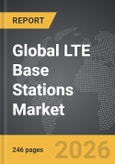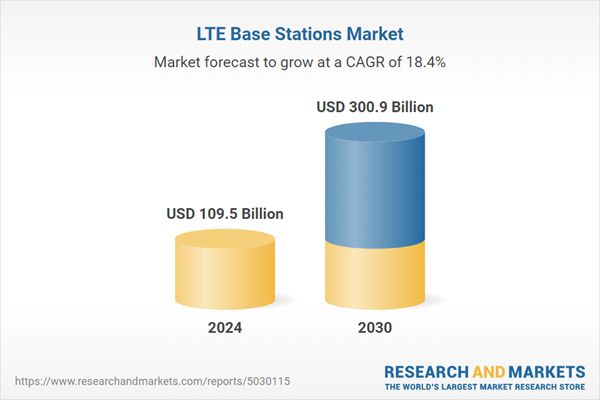Global LTE Base Stations Market - Key Trends & Drivers Summarized
Why Are LTE Base Stations Crucial in Today's Digital Landscape?
LTE (Long Term Evolution) base stations form the backbone of modern mobile telecommunications, facilitating high-speed data and voice services that are essential in today's digital-centric world. As the demand for mobile connectivity and increased data throughput continues to rise, LTE networks play a pivotal role in ensuring robust and reliable service. These base stations are equipped to handle the significant surge in mobile traffic driven by the proliferation of smartphones, tablets, and a myriad of IoT (Internet of Things) devices. The technology underpinning LTE base stations allows for greater coverage and capacity than previous-generation technologies, which is crucial in densely populated urban areas as well as in providing coverage to rural and remote locations. This capability not only enhances user experience by providing faster download speeds and reduced latency but also supports emerging technologies such as smart cities, augmented reality (AR), and virtual reality (VR) applications.How Is the Evolution of Consumer Technology Pushing LTE Expansion?
The rapid evolution of consumer technology, especially mobile devices and applications, is a significant driver for the expansion of LTE base stations. Consumers now expect seamless connectivity regardless of their location, prompting telecom operators to invest in LTE technology to deliver consistent, high-quality service. The increasing consumption of high-bandwidth content, such as streaming video and music, interactive gaming, and live broadcasting, requires telecommunications infrastructure that can manage large volumes of data efficiently. LTE base stations are equipped to support these demands with enhanced spectral efficiency and improved network management capabilities. As 4G LTE remains a critical part of the network architecture, even with the emergence of 5G, these base stations continue to receive upgrades to handle the evolving requirements of modern mobile users.What Role Does Government and Regulatory Policy Play in the LTE Market?
Government policies and regulatory frameworks have a profound impact on the deployment of LTE base stations. Many governments around the world view broadband connectivity as a key factor in socio-economic development and have thus implemented policies that encourage the rapid deployment of LTE networks. These policies often include the allocation of suitable spectrum bands to telecom operators, financial incentives for infrastructure development, and regulations that streamline the process of site acquisition and base station installation. Additionally, in many regions, governments have set ambitious targets for national broadband coverage, including mandates to provide high-speed internet access to rural and underserved areas, further stimulating investment in LTE technology. Such initiatives not only expand the reach of LTE networks but also enhance competitive dynamics in the telecommunications sector, leading to more innovative solutions and better services for consumers.The Growth in the LTE Base Stations Market Is Driven by Several Factors
The growth in the LTE base stations market is driven by several factors, reflecting the complex interplay of technology, regulatory environments, consumer behavior, and industry demands. Technological advancements that increase the efficiency, capacity, and coverage of LTE networks are key drivers, enabling telecom operators to offer superior services and cope with the growing data traffic. Consumer expectations for ubiquitous high-speed connectivity and the exponential increase in mobile and IoT devices necessitate ongoing upgrades and expansion of LTE infrastructure. Regulatory initiatives that promote broadband expansion and allocate necessary spectrum resources also play a crucial role in facilitating market growth. Moreover, as the transition to 5G accelerates, LTE base stations are being upgraded to support dual connectivity, ensuring that investments in LTE technology continue to yield benefits in the 5G era. These factors collectively contribute to the sustained growth and relevance of LTE base stations in the global telecommunications landscape.Report Scope
The report analyzes the LTE Base Stations market, presented in terms of market value (USD). The analysis covers the key segments and geographic regions outlined below.- Segments: Technology (TDD-LTE, FDD-LTE); End-Use (Residential & Small Office, Enterprise, Urban, Rural).
- Geographic Regions/Countries: World; United States; Canada; Japan; China; Europe (France; Germany; Italy; United Kingdom; and Rest of Europe); Asia-Pacific; Rest of World.
Key Insights:
- Market Growth: Understand the significant growth trajectory of the TDD-LTE Technology segment, which is expected to reach US$223.8 Billion by 2030 with a CAGR of 18.5%. The FDD-LTE Technology segment is also set to grow at 17.9% CAGR over the analysis period.
- Regional Analysis: Gain insights into the U.S. market, valued at $31.6 Billion in 2024, and China, forecasted to grow at an impressive 18% CAGR to reach $47.2 Billion by 2030. Discover growth trends in other key regions, including Japan, Canada, Germany, and the Asia-Pacific.
Why You Should Buy This Report:
- Detailed Market Analysis: Access a thorough analysis of the Global LTE Base Stations Market, covering all major geographic regions and market segments.
- Competitive Insights: Get an overview of the competitive landscape, including the market presence of major players across different geographies.
- Future Trends and Drivers: Understand the key trends and drivers shaping the future of the Global LTE Base Stations Market.
- Actionable Insights: Benefit from actionable insights that can help you identify new revenue opportunities and make strategic business decisions.
Key Questions Answered:
- How is the Global LTE Base Stations Market expected to evolve by 2030?
- What are the main drivers and restraints affecting the market?
- Which market segments will grow the most over the forecast period?
- How will market shares for different regions and segments change by 2030?
- Who are the leading players in the market, and what are their prospects?
Report Features:
- Comprehensive Market Data: Independent analysis of annual sales and market forecasts in US$ Million from 2024 to 2030.
- In-Depth Regional Analysis: Detailed insights into key markets, including the U.S., China, Japan, Canada, Europe, Asia-Pacific, Latin America, Middle East, and Africa.
- Company Profiles: Coverage of players such as Airspan Networks, Inc., AT&T, Inc., Cisco Systems, Inc., CommScope, Inc., Ericsson AB and more.
- Complimentary Updates: Receive free report updates for one year to keep you informed of the latest market developments.
Some of the 46 companies featured in this LTE Base Stations market report include:
- Airspan Networks, Inc.
- AT&T, Inc.
- Cisco Systems, Inc.
- CommScope, Inc.
- Ericsson AB
- Huawei Technologies Co., Ltd.
- Nokia Corporation
- Telenor ASA
- Telia Company AB
- ZTE Corporation
This edition integrates the latest global trade and economic shifts into comprehensive market analysis. Key updates include:
- Tariff and Trade Impact: Insights into global tariff negotiations across 180+ countries, with analysis of supply chain turbulence, sourcing disruptions, and geographic realignment. Special focus on 2025 as a pivotal year for trade tensions, including updated perspectives on the Trump-era tariffs.
- Adjusted Forecasts and Analytics: Revised global and regional market forecasts through 2030, incorporating tariff effects, economic uncertainty, and structural changes in globalization. Includes historical analysis from 2015 to 2023.
- Strategic Market Dynamics: Evaluation of revised market prospects, regional outlooks, and key economic indicators such as population and urbanization trends.
- Innovation & Technology Trends: Latest developments in product and process innovation, emerging technologies, and key industry drivers shaping the competitive landscape.
- Competitive Intelligence: Updated global market share estimates for 2025, competitive positioning of major players (Strong/Active/Niche/Trivial), and refined focus on leading global brands and core players.
- Expert Insight & Commentary: Strategic analysis from economists, trade experts, and domain specialists to contextualize market shifts and identify emerging opportunities.
Table of Contents
Companies Mentioned (Partial List)
A selection of companies mentioned in this report includes, but is not limited to:
- Airspan Networks, Inc.
- AT&T, Inc.
- Cisco Systems, Inc.
- CommScope, Inc.
- Ericsson AB
- Huawei Technologies Co., Ltd.
- Nokia Corporation
- Telenor ASA
- Telia Company AB
- ZTE Corporation
Table Information
| Report Attribute | Details |
|---|---|
| No. of Pages | 246 |
| Published | February 2026 |
| Forecast Period | 2024 - 2030 |
| Estimated Market Value ( USD | $ 109.5 Billion |
| Forecasted Market Value ( USD | $ 300.9 Billion |
| Compound Annual Growth Rate | 18.4% |
| Regions Covered | Global |









